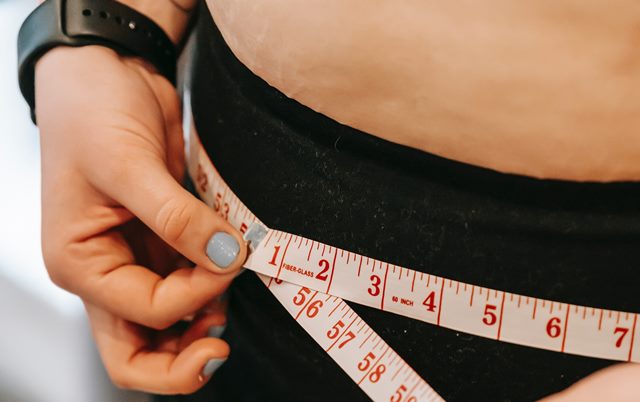Last Updated on May 15, 2023
Are you ready to shed the extra pounds and get your dream body? The secret lies in understanding the power of a calorie deficit! It’s a simple concept – burning more calories than you consume daily.
By creating a calorie deficit, your body is forced to burn stored fat for energy, leading to weight loss. So, let’s dive in and learn how to create a calorie deficit in a healthy, sustainable way and reach your fitness goals.

What Is Calorie Deficit?
A calorie deficit is when an individual burns more calories than they consume daily. When this happens, the body is forced to use stored energy sources, such as fat, to meet its energy needs. This can result in weight loss because the body burns fat for compensation.
A person may need to reduce their calorie intake, increase their physical activity, or a combination of both to achieve a calorie deficit. However, this can be achieved in healthy and unhealthy ways.
Most importantly, crash diets, skipping meals, and over-exercising are all unhealthy ways to achieve a calorie deficit. These practices can result in nutrient deficiencies, fatigue, and other health issues.
On the other hand, healthy ways to achieve a calorie deficit include making small changes to your diet, such as reducing portion sizes, eliminating sugary drinks, and increasing your intake of fruits and vegetables. Regular physical activity, such as brisk walking, cycling, or swimming, can also help you burn more calories each day.

It’s also worth noting that everyone’s calorie requirements differ depending on their age, gender, weight, and activity level. Therefore, a dietician or a health professional can assist you in calculating your calorie requirements. And also determine the appropriate amount of calories to consume and burn to achieve a calorie deficit.
Read: Dangerous Side Effects of Weight Loss Pills
How Can I Create a Calorie Deficit?
Here are a few ways to create a calorie deficit:
Reduce Your Calorie Intake
This is the most obvious way to create a calorie deficit. By reducing the calories you consume each day, you force your body to tap into stored energy sources, such as fat, to meet its energy needs.
Start by reducing portion sizes, cutting out sugary drinks and snacks, and increasing your intake of fruits and vegetables.
Increase Your Physical Activity
Increasing the number of calories you burn each day through physical activity can create a calorie deficit. Regular exercises, such as brisk walking, cycling, or swimming, can help help you burn more calories daily.
Keep Track of Your Progress

Keeping track of your progress is essential to creating a calorie deficit. Use a calorie tracking app or a food diary to track your daily calorie intake and expenditure. This will help you stay on track and make adjustments as needed.
Read: How to Create a Balanced and Nutritious Meal Plan
Consult a Dietician or a Health Professional
Consulting a professional can help you calculate your calorie needs and determine the right amount of calories to consume and burn to achieve a calorie deficit. They can also help you with meal planning and guide healthy ways to lose weight.
Be Patient
Losing weight takes time. It’s important to be patient and consistent with your efforts. Crash and fad diets might promise fast results, but they are not sustainable and can lead to health problems.

Read: How Does Sugar Consumption Affect Your Health?
What Are the Benefits of a Calorie Deficit Diet?
The benefits of calorie deficit go beyond weight loss. Hence, if you are looking to go through the process of calorie deficit with just the aim of losing weight, check out some of the benefits you can also enjoy. Below are some of the benefits of a calorie deficit:
Weight Loss
Weight loss is one of the most well-known benefits of a calorie deficit. Remember that losing weight isn’t always the primary goal for everyone. Also, it is essential to have realistic expectations. There are various body shapes and compositions, and losing weight does not always imply losing fat.
This implies that sometimes, losing weight means gaining muscle mass. And as a result, it is important to work with a dietician to calculate your calorie needs and determine the appropriate amount of calories to consume and burn to achieve a calorie deficit.
Keep in mind that weight loss is not a one-time event; it is a journey. Therefore, being patient and consistent with your efforts is important.
Improved Cardiovascular Health
Obesity is a major risk factor for heart disease, stroke, and high blood pressure. People who lose weight also reduce their risk of developing these conditions. By creating a calorie deficit, a person can lose weight and improve their cardiovascular health.
Furthermore, regular physical activity is essential for maintaining cardiovascular health. A calorie deficit journey helps increase a person’s likelihood of engaging in regular physical activity, which can improve cardiovascular health. And it is also known that exercise lowers blood pressure, raises cholesterol levels, and improves blood flow to the heart. Hence, one of the major benefits of calorie deficit is this.

Increased Energy Levels
As you lose weight, your energy levels may fluctuate at first. Your body is adjusting to the changes, and it may take some time. In the long run, however, a calorie deficit can lead to increased energy levels, better mood, and improved overall physical and mental performance.
Improved Insulin Sensitivity
Insulin is a hormone produced by the pancreas that regulates blood sugar levels. When glucose enters the bloodstream, insulin helps transport it into cells, which can be used as energy.
In individuals with insulin resistance, cells do not respond properly to insulin, leading to high blood sugar levels and an increased risk of diabetes.
Read: 7 Warning Symptoms of Diabetes
A calorie deficit can improve insulin sensitivity in several ways. Firstly, weight loss can improve insulin sensitivity by reducing the amount of fat in the body.
Fat cells, particularly those in the abdominal area, produce hormones and other substances that can interfere with insulin’s ability to transport glucose into cells. As a result, reducing the number of fat cells can improve insulin sensitivity.
In addition, calorie restriction has been shown to increase the production of a protein called AMPK, which helps to improve insulin sensitivity. AMPK activates enzymes that help to transport glucose into cells, thereby increasing insulin sensitivity.
A calorie deficit can also decrease inflammation, which is a risk factor for insulin resistance.
Improved Mental Health
Going through a calorie deficit can help boost mental health. Firstly, weight loss can improve self-esteem and body image, which can positively impact mental health. Furthermore, losing weight and improving physical appearance can increase self-confidence and self-worth.
Read: 7 Habits That Will Boost Your Mental Health
Additionally, regular physical activity can help reduce stress and improve mood. This is because exercise releases endorphins, which are known to improve mood and reduce feelings of depression and anxiety.
Are There Any Risks or Side Effects of a Calorie Deficit?
Most people on a calorie deficit diet do not experience too many side effects. There have been cases of fatigue, diarrhea, constipation, and nausea. You’ll reduce the chances of many side effects when you see a dietician. Let’s go over some of the possible risks of a calorie deficit diet.

Nutrient Deficiencies
When a person is in a calorie deficit, they may not consume enough of these essential nutrients, which can lead to deficiencies. For example, when a person reduces their calorie intake, they may also reduce their intake of iron, calcium, and vitamin D, leading to deficiencies in these nutrients.
These deficiencies can lead to various health problems, such as anemia, osteoporosis, and a weakened immune system.
In addition, when a person is in a calorie deficit, they may reduce their intake of healthy fats, which can lead to omega-3 and omega-6 fatty acid deficiencies. These deficiencies can lead to dry skin, brittle nails, and thinning hair.
Macronutrients are another important factor to consider. Proteins and carbohydrates are required for proper body function. As a result, reduced calorie intake may result in a lack of these macronutrients, which can also lead to deficiencies.
Slow Metabolism
Crash dieting or severely restricting calorie intake can slow down the metabolism, making it harder to lose weight in the long term. In other words, when the body is in a calorie deficit for an extended period, it may slow down the metabolism to conserve energy.
Hormonal Imbalances
Calorie restriction can also lead to hormonal imbalances, particularly with hormones that regulate hunger and fullness, such as leptin and ghrelin. Hormonal imbalances can make it harder to stick to a calorie-restricted diet, and can also lead to weight gain once the diet is over.
Fatigue and Low Energy
When a person is in a calorie deficit, they may feel fatigued and low on energy. This can make it harder to stick to an exercise routine and can negatively impact overall physical and mental performance.
Disordered Eating
Crash diets and restrictive calorie intake can lead to disordered eating patterns, such as binge eating, food obsession and even eating disorders.
Before you go…
Hey, thank you for reading this blog to the end. I hope it was helpful. Let me tell you a little bit about Nicholas Idoko Technologies. We help businesses and companies build an online presence by developing web, mobile, desktop, and blockchain applications.
We also help aspiring software developers and programmers learn the skills they need to have a successful career. Take your first step to becoming a programming boss by joining our Learn To Code academy today!
Be sure to contact us if you need more information or have any questions! We are readily available.











